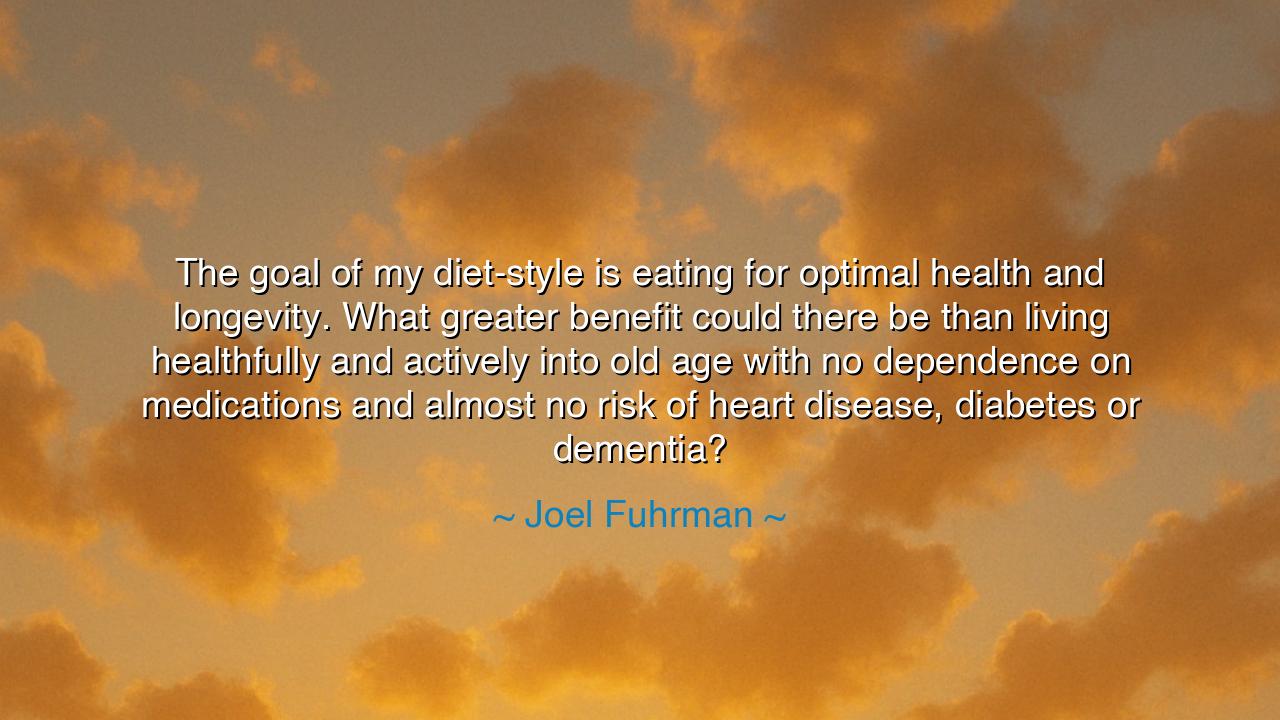
The goal of my diet-style is eating for optimal health and
The goal of my diet-style is eating for optimal health and longevity. What greater benefit could there be than living healthfully and actively into old age with no dependence on medications and almost no risk of heart disease, diabetes or dementia?






“The goal of my diet-style is eating for optimal health and longevity. What greater benefit could there be than living healthfully and actively into old age with no dependence on medications and almost no risk of heart disease, diabetes, or dementia?” Thus spoke Joel Fuhrman, physician and teacher of nourishment, who sought to remind humanity of a truth as ancient as life itself—that food is not merely sustenance, but medicine, and that the path to longevity lies not in pills or potions, but in the wisdom of how we live and eat. His words shine with the light of both science and spirit, calling us back to a sacred understanding that health is not an accident, but a daily act of devotion.
From the earliest civilizations, the sages and healers knew that the body is a temple, and that what we place within it determines its strength, its purity, and its grace. The great physician Hippocrates spoke it plainly: “Let food be thy medicine and medicine be thy food.” He understood that nature, in its abundance, provides all that the human form requires to thrive. Fuhrman’s philosophy is the echo of that timeless wisdom—rooted not in indulgence or denial, but in harmony with the design of life itself. To eat for optimal health is to align oneself with nature’s rhythm, to honor the miracle of the body by giving it the nourishment it was born to receive.
Yet how far humanity has drifted from this truth! In the modern world, where abundance has turned to excess and convenience has become a curse, we eat not to live but to escape, to numb, to fill a hunger that is no longer physical but spiritual. The body, overwhelmed by processed foods and lifeless fare, begins to rebel; the sacred balance collapses, and disease takes root. Fuhrman’s words strike against this forgetfulness like a clarion call: to return to the simplicity of whole foods, rich in life, color, and vitality. For what is a meal, if not a prayer of gratitude to the Earth? And what is health, if not the natural reward of living in harmony with creation?
Consider the life of the Okinawans of Japan, known for their extraordinary longevity and freedom from chronic disease. For centuries, they have lived by the principle of “Hara Hachi Bu”—to eat until one is eighty percent full. Their diet is humble yet powerful: grains, vegetables, seaweed, and legumes, with little meat or sugar. They live not to indulge, but to endure, and their endurance is radiant. Many live beyond a hundred years, their minds sharp, their spirits serene. They do not depend on medications, for their medicine is woven into their daily habits—their movement, their community, their food. Their lives are living proof of the truth Fuhrman proclaims: that longevity is not granted by chance, but earned through discipline and wisdom.
To live long is not enough; one must live well. What use is length of years if those years are weighed down by sickness and sorrow? The goal, as Fuhrman teaches, is not merely to delay death, but to expand the fullness of life itself—to walk, think, create, and love with vigor deep into the twilight of age. To reach old age with the body strong and the mind clear is to honor the gift of existence. The ancients called this state “balance”; in the East, it is known as “Qi in harmony.” Modern science names it homeostasis. Yet all these words point to the same eternal truth: well-being is not the absence of illness, but the presence of energy—positive, flowing, life-giving energy that animates the body, sharpens the mind, and nourishes the soul.
But this path demands mindfulness, not magic. It calls for conscious choice—the daily, deliberate act of honoring the body as a vessel of spirit. It requires saying no to that which is easy but empty, and yes to that which is natural and nurturing. Fuhrman’s “diet-style” is not a restriction, but a liberation—from dependency, from fatigue, from the slow erosion of vitality. It teaches us that the pursuit of health is not selfish, but sacred. For when we thrive, we radiate strength to those around us; when we preserve our energy, we can better serve the world.
So, my child, take this teaching to heart: Eat not merely to survive, but to sustain life’s brilliance within you. Choose foods that are alive, foods that come from the earth, that bear the mark of sun and rain. Move your body with gratitude; rest it with reverence. Let your daily habits become a form of prayer, and let your longevity be the hymn that rises from your care. For in the end, there is no greater wealth than health, no truer joy than to live long and free, and no deeper wisdom than this: that by honoring the mind, the body, and the spirit through how we nourish them, we draw closer to the divine rhythm of life itself.
And when your years grow long and your hair turns silver, may you look upon your life with peace, knowing that you did not merely add days to your years, but life to your days. That, as Joel Fuhrman said, is the greatest benefit of all.






AAdministratorAdministrator
Welcome, honored guests. Please leave a comment, we will respond soon